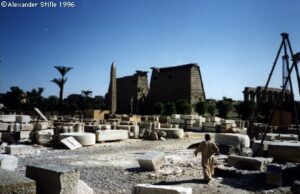Alexander Stille
- 1996

Fellowship Title:
- The Future of the Past
Fellowship Year:
- 1996

Is Modern Egypt Obliterating its Past?
Built along the Nile in Southern Egypt, the town of Luxor is near the ancient city of Thebes, which served as the capital of Egypt during the period known as The New Kingdom (1,539-1070 BC). In just a few square miles, it contains what is perhaps the greatest concentration of pharaonic monuments in Egypt: the glorious temples of Luxor and Karnak on one side of the river and the vast Theban necropolis on the other, containing the Valley of the Kings, the Valley of the Queens and the Valley of the Nobles, where Egyptian royalty of the New Kingdom from King Tutankhamen to Queen Nefertari have their tombs. Outside of the tourist area, life in Luxor is still largely rural and moves to the rhythms of life that were established in Egypt about six or seven thousand years ago when Nile Valley civilization began. You can see men following a horse and plow across a field, women carrying huge bundles of sticks on their heads and children driving a donkey cart. The ancient Egyptians believed
Is the Government Losing its Memory?
Note: This article contained pictures that were copyrighted and could not be published on this Web page. Captions for those pictures appear in italics. Scholars of antiquity and the Middle Ages often complain of insufficient information with which to piece together the historical record. Chroniclers of our own age may soon complain of the opposite problem: an avalanche of paper and electronic data that could make their task equally difficult, in its own way, as writing about the worlds of Plato or Charlemagne. The space now needed to house the records of the Supreme Court for a single term is equal to that used for the court’s records from 1789 to 1837 and the Archives are running out of space and money. Much of the government’s decision-making process is conducted today through electronic mail, but most of it is routinely erased. Numerous federal reports have warned that the United States was in danger of losing its memory by “erasing tomorrow’s records today” and the government is just waking up to the extent of the problem.
